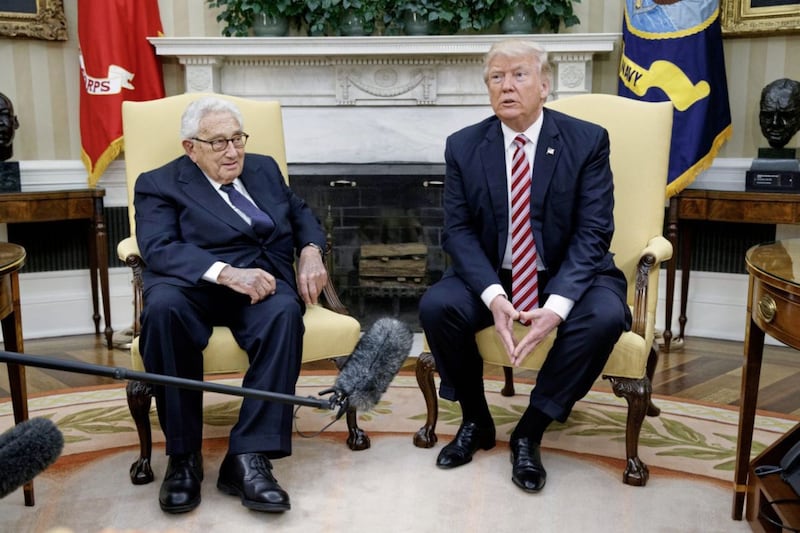It was back in the autumn of 2003 that I met Henry Kissinger in Washington DC – one of the world’s most famous diplomats – a man who as the New York Times noted yesterday on his death aged was both celebrated and reviled.
His passing and his legacy will be long examined in terms of America’s relations in post-World War II across the globe particularly regarding the Middle East, China, Russia, south America and of course Vietnam.
Twenty years ago as Irish News Political Correspondent I was on study programme along with journalists and diplomats from Europe on a three-week visit to the United States.
I was at that time the only Irish or UK journalist selected to take part in the US State Department study programme which focused on foreign affairs relating to both the Middle East and Northern Ireland as well as American electoral and local government issues.
As I recall the meeting with Kissinger was not inserted into the programme until a late stage.
Our small group was ushered into a Washington hotel room to await the arrival of the man himself.
Read more:
- Former US secretary of state Henry Kissinger dies aged 100
But we had to wait a good while until he turned up as he had earlier in the morning been called to an appointment with his heart doctor.
When Kissinger, like other remarkable figures on the world stage, entered the room somewhat breathless there was almost a hush of expectation amongst our gathered group but he soon relaxed and got down to the business of taking questions.
The ground-rules for this meeting was that we were not allowed to record the conversation or report in any way in any newspaper or publication.
It was not that there was any secret or revealing information in our discussions.
I asked him about the Irish peace progress and events flowing from the Good Friday Agreement and updated him on developments which I am sure he knew well about.
He expressed considerable hope for the development of the Northern Ireland peace in which America and the Clinton administration played such a significant and important role.
Then it was quickly on to questions relating to the Middle East and in particular a two-state solution to Israel/Palestine which I interpreted him as fully endorsing even though his answers were at times complicated and maybe even confusing.
We did not get any opportunity in the time remaining to question him about human rights, leading the Nixon policy in China, the carpet bombing of Cambodia, East Timor, or America’s part in the overthrow of Salvador Allende and the democratically elected government in Chile in 1973.
At the end of the meeting Kissinger presented me with a copy of his then new book entitled Crisis, the anatomy of two major foreign policy crises. It drew upon transcripts of his telephone conversations during the Yom Kippur War (1973) and the last days of the Vietnam War (1975).
He signed the book "to William Graham good wishes Henry A Kissinger".
I remember Kissinger as a small kind of pudgy burly man. He spoke with a gravely Bavarian accent...despite living in America from the age of 15 after fleeing from Germany in 1938 with the onset of Nazi rule.
There was however nothing `small’ about Kissinger’s role in the world in shaping United States foreign policy. No doubt one of the Realpolitik intellectuals of his time but one who was often condemned for being blind to war crimes. A lover of power perhaps as the ultimate aphrodisiac.
Certainly Kissinger, who was awarded the Nobel peace prize controversially for having jointly negotiated the 1973 Vietnam ceasefire, appeared to be the Machiavellian man.








